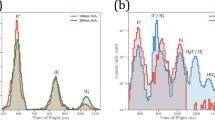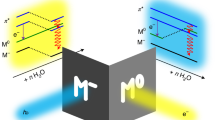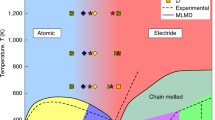Abstract
Solvated electrons have been postulated1–3 to exist in liquids and solids, and recent laboratory measurements4 have revealed that they exist even in the gas phase. In particular, these measurements suggest that eight water molecules are sufficient to bind an electron and give rise to a solvated electron of the kind (H2O)8−. This seems to be consistent with theoretical considerations5 suggesting that a dipole of molecular size must have a minimum dipole moment of about 2.5 D to support a bound state. According to theoretical calculations6, a cold, neutral water cluster (H2O)8 has a dipole moment of 4.61 D, so that larger (H2O)n clusters may be expected to bind an electron. Building on these ideas I consider here the possibility that solvated electrons may also exist in the Earth's upper atmosphere and that they may affect nucleation and aerosol formation. Furthermore, I suggest that upper-atmosphere solvated electrons may be detected, using rocket-borne ion mass spectrometers, and that they may be used as tracers for probing condensation nuclei.
This is a preview of subscription content, access via your institution
Access options
Subscribe to this journal
Receive 51 print issues and online access
$199.00 per year
only $3.90 per issue
Buy this article
- Purchase on Springer Link
- Instant access to full article PDF
Prices may be subject to local taxes which are calculated during checkout
Similar content being viewed by others
References
Jortner, J. & Kerster, N. R. (eds) Electrons in Fluids (Colloque Weyl III, Tel Aviv, 1972).
Hart, E. & Anbar, M. The Hydrated Electron (Wiley, New York, 1970).
Compton, R. N. Electronic and Atomic Collisions, 251 (North Holland, Amsterdam, 1980).
Armbruster, M., Haberland, H. & Schindler, H. G. Phys. Rev. Lett. 47, 323 (1981).
Garrett, W. R. J. chem. Phys. 71, 651 (1979).
Stillinger, F. H. & David, C. W. J. chem. Phys. 73, 3384 (1980).
Arnold, F. Proc. 5 th ESA-Symp. on European Rocket and Balloon Programmes and Related Research, Bournemouth, 479 (ESA SP-152, 1980).
Ferguson, E. E., Fehsenfeld, F. C. & Albritton, D. L. in Gas Phase Chemistry (ed. Bowers, M. T.) (Academic, New York, (1979).
Arnold, F. Planet. Space Sci. 28, 1003 (1980).
Björn, L. & Arnold, F. Geophys. Res. Lett. (submitted).
Witt, G. Space Res. 9, 157 (1969).
Kebarle, P. A. Rev. Phys. Chem. 28, 445 (1977).
Arnold, F. Nature 284, 610 (1980).
Biondi, M. A. Can. J. Chem. 47, 1711 (1969).
Smith, D. & Church, M. J. Planet. Space Sci. 25, 433 (1977).
Smith, D. & Adams, N. G. in Topics in Current Chemistry (Springer, Berlin, 1980).
Hunten, D. M., Turco, R. P. & Toon, O. B. J. atmos. Sci. 37, 1342 (1980).
Author information
Authors and Affiliations
Rights and permissions
About this article
Cite this article
Arnold, F. Solvated electrons in the upper atmosphere. Nature 294, 732–733 (1981). https://doi.org/10.1038/294732a0
Received:
Accepted:
Issue Date:
DOI: https://doi.org/10.1038/294732a0
This article is cited by
-
Spectroscopy and dynamics of the hydrated electron at the water/air interface
Nature Communications (2024)
-
Electron affinity of liquid water
Nature Communications (2018)
-
Energetic Particle Influence on the Earth’s Atmosphere
Space Science Reviews (2015)
-
Atmospheric Ions and Aerosol Formation
Space Science Reviews (2008)
-
Atmospheric Aerosol and Cloud Condensation Nuclei Formation: A Possible Influence of Cosmic Rays?
Space Science Reviews (2007)
Comments
By submitting a comment you agree to abide by our Terms and Community Guidelines. If you find something abusive or that does not comply with our terms or guidelines please flag it as inappropriate.



